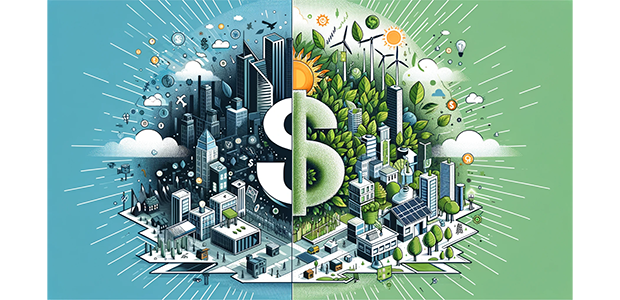
How can sustainable companies challenge the ‘purse or planet’ narrative?
This year is set to bring challenging but interesting times for sustainability communications. At the end of last year, 2023, the head of a national oil company led the most important climate summit in the world – COP28 – and meanwhile, our own government signed off on new oil and gas licences and rolled back on its net zero pledges.
On the one hand, there is a huge sense of anxiety and urgency around the issue of climate change, but at the same time, there are increasingly contradictory messages filtering down from those in charge.
One narrative the UK Government seems currently intent on driving forward, is that of purse vs planet – ‘you can have it green or you can have it cheap, but you can’t have both’ appears to be the general message.
For sustainable businesses looking to argue against or question this – honesty and transparency is likely to be the best policy. This requires clarity and a positive outlook regarding how innovative solutions can help solve pressing eco issues, as well as a realistic approach concerning what needs to happen over the long term, such as an overhaul of food systems or greater investment into green infrastructure.
If we look to the past, there’s no shortage of examples highlighting the possibilities. Solar panels were once judged to be too costly and not efficient enough – they’re now the cheapest form of energy in the world. Ten years ago, experts thought bigger, more powerful, and efficient wind turbines were out of the question, but last year the largest turbine ever built began operation in China and can even work during typhoons. EVs were once deemed too costly to buy, but the price is dropping as the technology scales and they become cheaper than ICEs to run.
But we don’t want to get stuck looking too far into the future or leaning too heavily on the successes of the past, it’s the actions forward thinking companies are taking right now that will really make an impact.
Take alternative proteins, for example. Over the past half a decade, we’ve seen a huge overhaul of the plant-based sector, with these options becoming easier for consumers to make the switch to. But the transition to reduced meat consumption is held back by the fact that sustainable choices still often cost too much. You can have all of the positive, planet-saving messaging, but amidst a cost of living crisis, there’s no getting away from the fact that, in the short term at least, price will often beat climate.
Just recently, however, Lidl in Germany has taken ambitious steps to begin to offer a solution to this issue. It’s not only price-matching its plant based consumer range with the meat and dairy it sells, but it’s also placing these products alongside meat in the aisles, no longer confining them to a separate vegan section.
UK brands take note: this type of approach can bridge the gap between the intention to help the planet in the long term and enabling people to make easier, cost effective, and more climate-conscious choices right now, and that’s the intersection at which real change happens.

